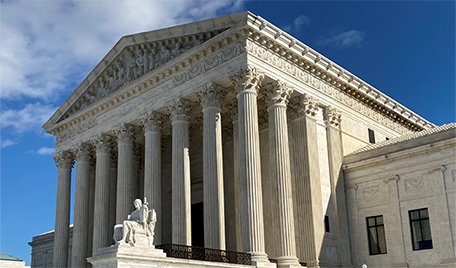A divided Supreme Court on June 28, 2024 overturned a lower court decision which held that local government ordinances regulating homeless encampments in public spaces were “cruel and unusual punishment.”
 In a 6-3 decision, Justice Neil Gorsuch writing for the majority in Grants Pass v. Johnson wrote that the Eighth Amendment’s prohibition against “cruel and unusual punishment” did not apply to general laws pertaining to camping on public property.
In a 6-3 decision, Justice Neil Gorsuch writing for the majority in Grants Pass v. Johnson wrote that the Eighth Amendment’s prohibition against “cruel and unusual punishment” did not apply to general laws pertaining to camping on public property.
The city of Grants Pass, Ore., had passed three laws prohibiting camping inside parks and on sidewalks, rights of way, bridges, and other public property. Violations of the laws first resulted in civil fines, and the charges escalated to temporary bans and short jail terms for serial violators.
A district court cited Martin v. Boise, a Ninth Circuit appeals court decision, which held that the punishment of the homeless violated the Eight Amendment since they had no access to shelter. A divided Ninth Circuit Court of Appeals upheld the district court’s rulings.
However, the Supreme Court’s opinion interpreted the amendment’s application differently: “Homelessness is complex. Its causes are many. So may be the public policy responses required to address it. The question this case presents is whether the Eighth Amendment grants federal judges primary responsibility for assessing those causes and devising those responses,” Justice Gorsuch wrote. “A handful of federal judges cannot begin to ‘match’ the collective wisdom the American people possess in deciding ‘how best to handle’ a pressing social question like homelessness.”
Chief Justice John Roberts, along with Justices Clarence Thomas, Samuel Alito, Brett Kavanaugh, and Amy Coney Barrett, joined Gorsuch’s opinion. Thomas concurred in a separate opinion, while Justices Sonia Sotomayor, Elena Kagan and Ketanji Brown Jackson (in part) dissented.
Gorsuch’s opinion did not overturn Robinson v. California, a Supreme Court case from 1962, used by the Ninth Circuit to uphold its Martin decision. In Robinson, a majority of justices invalidated a California law that made drug addiction illegal, even when someone had not engaged in any illegal conduct involving drugs. Instead, Gorsuch said another Warren Court decision from 1968, Powell v. Texas, was more appropriate in this case.
“The Cruel and Unusual Punishments Clause focuses on the question what ‘method or kind of punishment’ a government may impose after a criminal conviction, not on the question whether a government may criminalize particular behavior in the first place,” Gorsuch said, citing Powell.
“Grants Pass’s public-camping ordinances do not criminalize status. The public-camping laws prohibit actions undertaken by any person, regardless of status. It makes no difference whether the charged defendant is currently a person experiencing homelessness, a backpacker on vacation, or a student who abandons his dorm room to camp out in protest on the lawn of a municipal building,” Gorsuch concluded.
Thomas, writing separately, believed that the Robinson case from 1962 was wrongly decided.
But Thomas agreed that the Grant Pass case was not the vehicle to overturn Robinson. “To be sure, we need not reconsider Robinson to resolve this case. As the Court explains, the challenged ordinances regulate conduct, not status,” he said.
Sotomayor’s dissent echoed points made during arguments that supported the Ninth Circuit’s ruling that the Eighth Amendment came into effect when homeless people had no alternative shelter for their use, and faced fines for using public property.
“The City of Grants Pass jails and fines those people for sleeping anywhere in public at any time, including in their cars, if they use as little as a blanket to keep warm or a rolled-up shirt as a pillow. For people with no access to shelter, that punishes them for being homeless. That is unconscionable and unconstitutional, Sotomayor said.
Sotomayor also believed the Court needed to apply the Due Process Clause in the Constitution’s Fifth Amendment and 14th Amendment to what she called anti-homelessness ordinances. “The Court’s misstep today is confined to its application of Robinson. It is quite possible, indeed likely, that these and similar ordinances will face more days in court.”
“This Court, too, has a role to play in faithfully enforcing the Constitution to prohibit punishing the very existence of those without shelter,” she noted.
In Friday’s decision, the full case was sent back for further proceedings consistent with the Court’s opinion.
Scott Bomboy is the editor in chief of the National Constitution Center.







